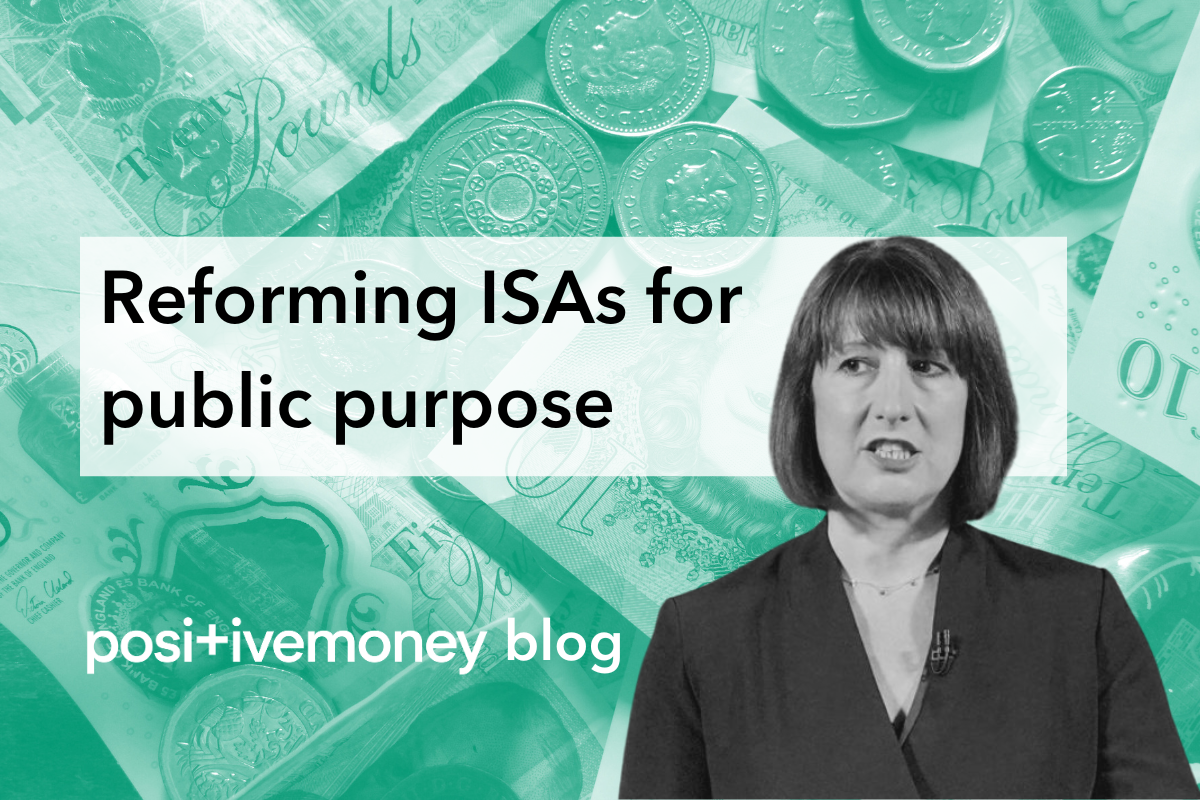
UKGlobal
27 January 2026
With proposals to reform Individual Savings Accounts (ISAs), politicians are confusing primary and secondary markets, as well as savings and investment. Instead of promoting stock market speculation, we can use ISAs to build a better financial system for people and planet
Rumours have been revived this week that Chancellor Rachel Reeves may slash the tax-free cap on cash ISAs at next month’s Budget, in a perplexing attempt to inflate the stock market. Having celebrated the postponement of these plans earlier in the year, if reforms do go ahead, we hope Reeves will use them to announce a new ISA for public purpose.
While insisting that the bond market curtails the government’s ability to borrow to invest, the Treasury curiously seems to be intent on weakening its hand by discouraging the holding of its debt (known as ‘gilts’). With pension reform weakening demand for gilts and therefore pushing up long-term borrowing costs, the government also wants to make matters worse by reheating plans to lower the tax free allowance for cash ISAs. Despite the idea propagated by asset managers and politicians that cash ISAs represent literal cash under the mattress and are therefore a drain on the economy, banks and building societies typically use cash ISAs to fund holdings of government bonds, as well as mortgages. It is unclear why any government should want to increase its cost of borrowing, as well as mortgage rates, but that will be the likely effect of reducing cash ISA holdings.
The Treasury hopes that by reducing the tax-free allowance for cash ISAs specifically, the public will be nudged to move funds to riskier stocks and shares ISAs, thus creating an ‘investment’ culture that fuels growth. This however is nonsensical.
It’s fallen to the Financial Time’s Skin in the Game columnist, and former portfolio manager, Stuart Kirk, to point out that “Rachel Reeves is confusing her primary and secondary markets, just as many financial commentators do.” The money moved to stocks & shares ISAs will be used to buy previously issued shares on secondary markets such as the FTSE (if it is invested in UK assets at all), rather than the purchase of new shares issued by companies on primary markets, which finances investment.
Put differently, Reeves may be making an even more fundamental macroeconomic error in confusing saving with investment, which her apparent hero Joan Robinson, alongside Keynes, warned against. The proper meaning of investment is an addition to real capital - i.e the building of a factory or a house. Meanwhile, simply acquiring a title to capital, such as a share or a mortgage, is a form of saving. While the sum of savings aligns with investment, as the increase in income from investment increases savings, as Robinson explained, “The desire to save does not promote investment.”
While cash ISA savings also don’t directly lead to new investment, which is initially financed by banks via the creation of deposits, they provide banks with cheap longer-term funding, which could be used to support real capital formation. This ideal version of banking is thwarted by the reality of the UK’s banking system, which is dominated by big shareholder-owned banks, who are compelled to maximise short-term returns for their shareholders. As a result, rather than financing the productive capital development of the UK, the vast majority of bank credit creation is for the purchase of pre-existing assets, typically via mortgages, which offer the highest return on equity.
Any issue with cash ISAs is ultimately with banks' allocation of credit. The problem for the government is that there is no reason to believe that shifting funding away from banks and towards financial markets will improve, rather than worsen, the UK’s investment problem.
In reality there is little connection between the stock market and real capital formation, as the vast majority of money poured into markets flows towards the owners of previously issued shares, rather than companies issuing new shares. If the stock market grows as a result of ISA reform, it will therefore be through inflating the price of existing shares, rather than new capital formation.
The impact of this inflation will be to make the stock market less rational and an even less effective vehicle for efficient capital allocation, with the chief beneficiaries being wealthy shareholders and financial intermediaries extracting fees and commissions from new trading activity.
Yet, as the FT’s Stuart Kirk points out, there is not necessarily even reason to think that this will increase share prices, which the returns promised to the public are based on. Shrewd investors would likely follow Kirk in selling as stock prices rise and valuations worsen. For aspiring retail shareholders, smart value investing will become even more difficult as share prices get inflated and further detached from fundamentals.
Proponents may argue that the increased liquidity enjoyed by stock markets could help businesses raise finance from issuing new shares. While equity financing may be ideal for many businesses, few are in a position to issue shares that can be publicly traded, which is why Small and Medium-sized Enterprises (SMEs) - which provide the majority of employment in the UK - have typically relied on bank lending, rather than markets, as a source of finance.
The tax-free allowance on ISAs, whether for ‘cash’ or ‘stocks & shares’, can essentially be thought of as a subsidy to wealthier savers, as well as financial intermediaries who enjoy the liquidity. Whilst we welcomed Reeves halting plans to slash the cap, and recognise that getting rid of the tax-free allowance altogether would be politically toxic, with ISA reform back on the agenda, there is an opportunity to rethink how this subsidy can be used to guide credit towards facilitating real capital formation and sustainable prosperity.
While it is indeed true that savers get a bad deal from most banks (which have managed to avoid passing on years of higher interest rates to depositors) the public understandably values the ‘moneyness’ and therefore safety of cash ISAs. However, with the right policies, the ambition to deliver productive investment and fairer returns does not have to come at the cost of greater risk for savers.
Rather than pushing people into stocks & shares ISAs, the government could instead offer a new tax-free savings product which actually delivers productive investment, in the vein of the successful Livret A deposits scheme in France. Just as Livret A deposits provide funding for the French development bank, CDC, to build social housing and lend to SMEs, the UK could introduce a product that provides funds for public financial institutions benefiting from recent fiscal rule changes, such as the National Wealth Fund (NWF), GB Energy and Homes England, to invest in SMEs, clean energy and social housing. If the government wants to increase new streams of equity financing, which would be welcome, the NWF could tilt its portfolio towards purchasing equity stakes in SMEs. Such a product could perhaps be called a NWF ISA, allowing the public to more directly feel the benefit of the government’s flagship public development bank.
The government has committed to doubling the size of the mutual sector, and the growth of such member-owned models in the UK banking system will do a lot to improve the allocation of credit and ensure financial returns are shared more equitably. Unlike the UK’s big publicly-listed banks, such ‘stakeholder’ lenders are freed from the compulsion to maximise short-term returns for shareholders that prevents them supporting communities.
Cash ISAs are an important source of funding for mutually-owned lenders such as building societies, who do not have the same access to capital markets as the big shareholder-owned banks. To help level the playing field between the shareholder banks and stakeholder banks, the government could keep the full tax-free allowance for cash ISAs offered by building societies and mutuals.
Introducing a new ‘NWF ISA’ product as an ISA for public purpose, while allowing stakeholder banks to enjoy the benefits of cash ISAs, could help overcome the chronic issue of the UK’s financial system being dominated by a handful of big banks whose sole purpose is to maximise value for shareholders at the expense of the real capital development of the economy.
Sign-up to our mailing list for regular updates, or donate to support our work to redesign our economic system for social justice and a liveable planet.
